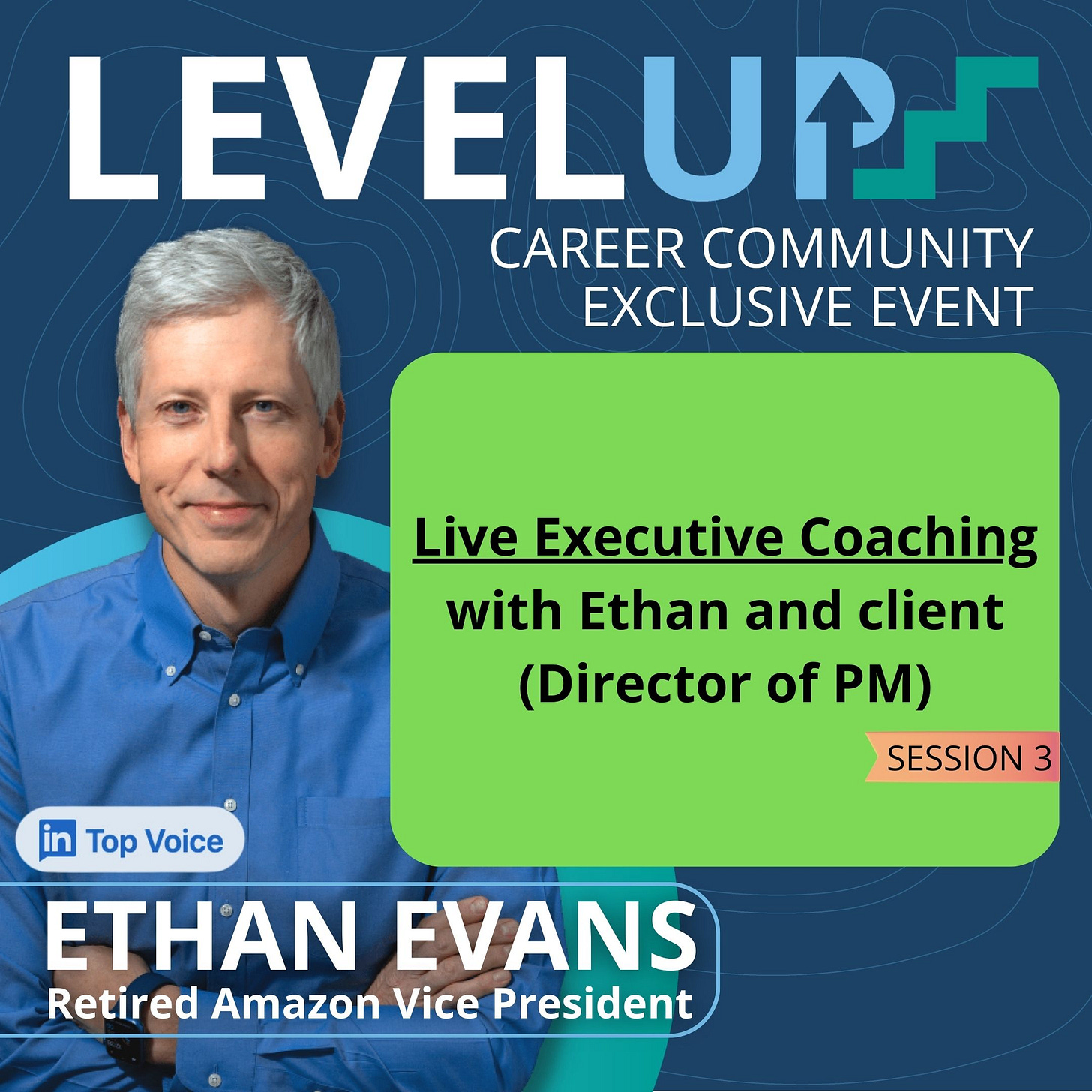Level Up Career Community Event:
On March 11 (Monday), watch Ethan live coach a real client (Director of PM at a big tech company), on the topic "How can I manage my time and energy against my work and non-work goals?"
See how executive coaching works and learn alongside Ethan’s client.
The live event and video recording are exclusive to community members.
To become a member, signup to be a paid newsletter subscriber here.
What members have said:
Existing members, register here.
"Work smarter, not harder!"
I worked hard for a long time before I learned to work smarter.
I will try to answer HOW to work smarter.
To work "smarter" you have to begin with knowing (or asking and learning) the purpose of the work. Only by knowing why you are doing something can you then smartly reason about the best solutions and the right priorities.
The second part of working smarter is to accept up front that you cannot do all the good work. There will always be more than you can get to. Working smarter involves choosing which things to do and which things not to do. Steve Jobs famously stated that what he said no to was as important as what he did. Once you really understand the work and think deeply about it, choosing what to do, what not to do, and how to prioritize it is what makes "smart" work.
I've written about prioritization before (read here and read here), so a short version here. Force yourself to work on the most important things, not the most urgent or easiest things. Do the few things that will matter in the long term, not the many things in your inbox. The things that matter are those that will make a long-term positive change for the business. Also, prioritize automation or process changes that will save you time in the future.
Doing all of this requires courage. When you say no, people may be upset. When you make choices of what not to do, you may choose wrongly. Have guts, pick, and if you are wrong, fix it when you realize it. Do this consistently and you will be rewarded.
It is possible to work smarter, but it is an intentional process.
Be intentional and be successful!
Audience Insights
Additional ideas worth considering from my LinkedIn audience:
When Steve Jobs returned as Apple CEO in 1997, Apple had 40 products in market. He met with Jony Ive (SVP of Industrial Design) and asked: “Jony, how many things have you said no to?” Ive was confused. Jobs went on to explain: “You have to understand. There are measures of focus, and one of them is how often you say no. What focus means is saying no to something that you—with every bone in your body—think is a phenomenal idea, and you wake up thinking about it, but you say no to it because you’re focusing on something else.”
To be successful, the truth is you need to work hard and work smart. If you are starting a new role, launching a new business/product, or just starting your career — build a reputation for hard work. Once you create value, then shift your focus to creating leverage to work smart. Similar to trust, leverage is earned (not given).
Think about how well you are prioritizing the most important things in terms of getting to where you only spend time on (a) High value work that only you can do and (b) Things you love to do.
Many managers are on the edge of burnout. One part of the problem is ineffective delegation. Try this one simple question with your employees: “What do you recommend?” By doing so, empower them to take action, support them to act with autonomy, and you turn them into owners. Most of the time your employees will have a good answer, or if they don’t, they may surprise you (in a good way).
Tim Grover (performance trainer to Michael Jordan and Kobe Bryant) said that Jordan worked “smarter” while Kobe worked “harder”. Kobe never stopped working, whereas Jordan knew when to listen to his body and stop (e.g. Jordan knew that sleep and rest was part of his training).
Marcus Aurelius (Roman emperor known as “The Philosopher King”) said that focus brings a double satisfaction: “Doing less, better.”
Concentrate your focus. Arthur Schopenhauer (German philosopher) wrote: “Intellect is a magnitude of intensity, not a magnitude of extensity.”
If you found this article helpful, share it with your peers and team.
Learn to manage up successfully
I developed the on-demand course, Managing Up Successfully, to teach you the skills to develop a productive relationship with your manager, senior peers, and your skip level leadership chain.
Watch the introduction video below to see what you will get.
Connect With Me
Click here to follow me on LinkedIn.
Click here to follow me on Twitter.
Level Up is a newsletter from retired Amazon Vice President Ethan Evans that breaks down how he succeeded and how you can get to the next level.






